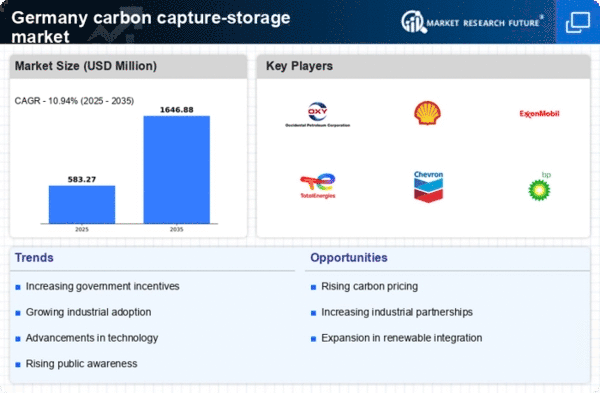Rising Environmental Awareness
The carbon capture-storage market is experiencing a surge in demand driven by increasing environmental awareness among the populace. Citizens are becoming more cognizant of climate change and its impacts, leading to a greater push for sustainable practices. This heightened awareness is reflected in public support for policies that promote carbon capture technologies. According to recent surveys, approximately 75% of the German population supports government initiatives aimed at reducing carbon emissions. This societal shift is likely to encourage investments in the carbon capture-storage market, as companies seek to align their operations with public sentiment and environmental goals. Furthermore, as more individuals advocate for climate action, the pressure on industries to adopt carbon capture solutions intensifies, potentially leading to a more robust market landscape in the coming years.
Government Policy and Frameworks
Government policy and regulatory frameworks are crucial drivers of the carbon capture-storage market. The German government has established a comprehensive climate action plan that includes specific targets for carbon reduction, aiming for a 55% reduction in greenhouse gas emissions by 2030. This ambitious goal necessitates the implementation of carbon capture technologies across various sectors. Additionally, the government has introduced financial incentives, such as grants and tax breaks, to encourage investments in carbon capture projects. These policies are designed to create a favorable environment for the development and deployment of carbon capture solutions. As a result, the carbon capture-storage market is likely to benefit from increased funding and support, facilitating the growth of innovative projects and technologies.
Corporate Sustainability Commitments
The carbon capture-storage market is significantly influenced by the growing trend of corporate sustainability commitments. Many companies are setting ambitious targets to achieve net-zero emissions by 2050, which necessitates the integration of carbon capture solutions into their operations. A recent report indicates that over 60% of major corporations in Germany have pledged to invest in carbon reduction technologies, including carbon capture and storage. This corporate shift not only enhances the market's growth potential but also encourages collaboration between businesses and technology providers. As firms seek to fulfill their sustainability goals, the demand for effective carbon capture solutions is likely to rise, thereby propelling the carbon capture-storage market forward. This trend underscores the critical role of private sector engagement in addressing climate change challenges.
Technological Advancements in Carbon Capture
Technological advancements play a pivotal role in shaping the carbon capture-storage market. Innovations in capture technologies, such as direct air capture and bioenergy with carbon capture and storage (BECCS), are enhancing efficiency and reducing costs. For instance, recent developments have led to a reduction in capture costs by up to 30%, making these technologies more accessible to various industries. As companies strive to meet stringent emissions targets, the adoption of these advanced technologies is likely to accelerate. The German government has also recognized the importance of innovation, allocating approximately €1 billion to research and development in carbon capture technologies. This investment is expected to foster a competitive environment, driving further advancements and expanding the carbon capture-storage market.
International Collaboration and Knowledge Sharing
International collaboration and knowledge sharing are emerging as vital components of the carbon capture-storage market in Germany. As countries strive to meet global climate commitments, partnerships between nations, research institutions, and private enterprises are becoming more prevalent. Germany has engaged in various international initiatives aimed at advancing carbon capture technologies, sharing best practices, and fostering innovation. For example, collaborative projects with countries like Norway and the Netherlands focus on developing large-scale carbon capture facilities. Such partnerships not only enhance technological capabilities but also provide access to funding and expertise. This collaborative approach is likely to strengthen the carbon capture-storage market, as it encourages the exchange of ideas and accelerates the deployment of effective solutions.
















